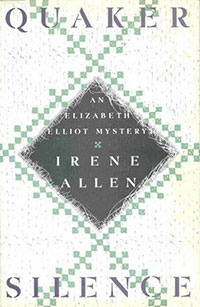
By Dennis Fischman
It’s funny, I’ve recently read two different mysteries set in Cambridge, MA, around the environs of Harvard – this one and The Memorial Hall Murder. The two books couldn’t be more different. Jane Langton created quirky characters, some lovable (like Homer Kelly) and some so villainous you could almost hear them spit with every sentence.
In Quaker Silence, author Irene Allen takes a more humane approach. Her people are flawed characters striving to be good, no matter what role they play in the story. Her detective, 66-year-old Elizabeth Elliot, can sometimes be self-righteous (and she knows it, and deplores it), and sometimes she bends corners on ethical issues when she feels she hears a higher call out of the silence.
Elliot is the Clerk of the Quaker Meeting in Cambridge, and one of her members is murdered outside his own home shortly after he declares that soon, he’s going to give away the considerable fortune he’s made in business.

“Quaker Silence”
by Irene Allen
Villard Books, 1992
Is the murderer the homeless man who sometimes attends the Meeting to denounce the hypocrisy of rich people who declare allegiance to simplicity? Is it his gay nephew, who might be cut out of the will? Or is it another member of the Meeting? And where does conscience direct Elizabeth: toward neutrality and letting matters unfold, or toward actively investigating the murder – even if it involves lying to people who are supposed to trust her?
I will ask a friend of mine who attends Quaker meetings in Cambridge today whether the description of prayer and business meetings rings true. I suspect it does. (On the other hand, when Elizabeth’s niece Sarah is dating a Jewish guy and he says he “reads” Friday nights at Hillel, I have to shake my head and say, “Good try at cultural awareness, but not even close!”)
I would not want to be Elizabeth Elliot’s friend, let alone her Friend. I will want to spend more time in her company, however, by reading the next book in the series.

 https://www.portersquarebooks.com/
https://www.portersquarebooks.com/












